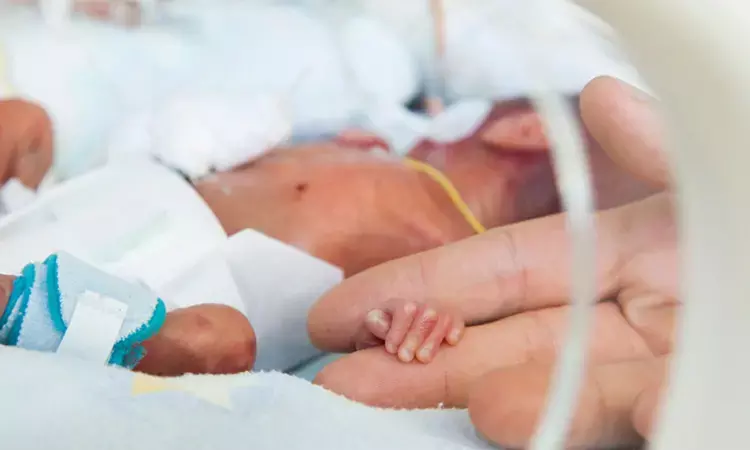- Home
- Medical news & Guidelines
- Anesthesiology
- Cardiology and CTVS
- Critical Care
- Dentistry
- Dermatology
- Diabetes and Endocrinology
- ENT
- Gastroenterology
- Medicine
- Nephrology
- Neurology
- Obstretics-Gynaecology
- Oncology
- Ophthalmology
- Orthopaedics
- Pediatrics-Neonatology
- Psychiatry
- Pulmonology
- Radiology
- Surgery
- Urology
- Laboratory Medicine
- Diet
- Nursing
- Paramedical
- Physiotherapy
- Health news
- Fact Check
- Bone Health Fact Check
- Brain Health Fact Check
- Cancer Related Fact Check
- Child Care Fact Check
- Dental and oral health fact check
- Diabetes and metabolic health fact check
- Diet and Nutrition Fact Check
- Eye and ENT Care Fact Check
- Fitness fact check
- Gut health fact check
- Heart health fact check
- Kidney health fact check
- Medical education fact check
- Men's health fact check
- Respiratory fact check
- Skin and hair care fact check
- Vaccine and Immunization fact check
- Women's health fact check
- AYUSH
- State News
- Andaman and Nicobar Islands
- Andhra Pradesh
- Arunachal Pradesh
- Assam
- Bihar
- Chandigarh
- Chattisgarh
- Dadra and Nagar Haveli
- Daman and Diu
- Delhi
- Goa
- Gujarat
- Haryana
- Himachal Pradesh
- Jammu & Kashmir
- Jharkhand
- Karnataka
- Kerala
- Ladakh
- Lakshadweep
- Madhya Pradesh
- Maharashtra
- Manipur
- Meghalaya
- Mizoram
- Nagaland
- Odisha
- Puducherry
- Punjab
- Rajasthan
- Sikkim
- Tamil Nadu
- Telangana
- Tripura
- Uttar Pradesh
- Uttrakhand
- West Bengal
- Medical Education
- Industry
Amikacin use tied to significant reduction of Kidney function among neonates

Namibia: A recent study has found that successive neonates' exposure to gentamicin and amikacin increases the chances of kidney function suppression in neonates due to extended exposure to these nephrotoxic drugs. The study appeared in the BMC Pediatrics on 16 January 2023.
"In neonates receiving amikacin, eGFR (estimated glomerular filtration rate) decreased significantly as a function of postnatal age, but about 97.1% of these neonates were able to clear the drug to less than five mcg/mL within an interval of 24-hour dosing," the researchers wrote in their study.
Amikacin and gentamicin are aminoglycoside antibiotics excreted renally and are known to be nephrotoxic. In neonates, the eGFR per body surface is lower than in adults, and exposure to these drugs could lead to more suppression of kidney function. Considering this, Bonifasius Siyuka Singu from the University of Namibia in Windhoek, Namibia, and colleagues aimed to determine the minimum and maximum plasma concentrations (Cmin and Cmax), to assess eGFR in preterm and term neonates and the time to reach Cmin levels of amikacin and gentamicin.
For this purpose, the researchers recruited two groups of patients; 44 neonates received gentamicin at a dose of 5 mg/kg/24 h and 35 neonates received amikacin at a dose of 15 mg/kg/24 h by slow IV (intravenous) injection. Before being switched to amikacin, patients on amikacin had been on gentamicin. Two blood samples were drawn to determine the maximum and minimum plasma concentrations. Cmin, Cmax, and the time it took for aminoglycoside to clear to a plasma concentration below the toxicity threshold (amikacin: < 5 mcg/mL; gentamicin: < 1 mcg/mL) were determined (primary outcomes).
The authors reported the following:
· 2.9% and 27.3 of neonates, respectively, achieved a therapeutic range for Cmax of amikacin (30–40 mcg/mL) or gentamicin (15–25 mcg/mL).
· 72.7% for gentamicin and 97.1% for amikacin of neonates reached plasma concentrations below the toxicity threshold within the 24-hour dosing interval.
· Positive correlation between gentamicin clearance and postnatal age had borderline statistical significance, while the correlation between amikacin clearance and postnatal age was poor and not statistically significant (r2 = − 0.30).
"The study's findings indicate that neonates successively exposed to gentamicin and amikacin as first- and second-line therapy, respectively, could result in nephrotoxicity, as shown by the significant eGFR decline in patients who had been exposed to aminoglycoside therapy longer," the researchers wrote.
However, the study showed that a considerably high proportion of patients (72.7% for gentamicin and 97.1% for amikacin) could clear the drug to reach concentrations below the toxicity threshold within the dosage interval of 24 hours.
"To improve the safety and efficacy of gentamicin and amikacin in newborns, eGFR should be monitored, and the dose can be adjusted using the pharmacokinetic approach," they concluded.
Reference:
Singu, B.S., Ndeunyema, M.N., Ette, E.I. et al. Plasma concentration and eGFR in preterm and term neonates receiving gentamicin or successive amikacin therapy. BMC Pediatr 23, 24 (2023). https://doi.org/10.1186/s12887-023-03834-4
Dr Kartikeya Kohli is an Internal Medicine Consultant at Sitaram Bhartia Hospital in Delhi with super speciality training in Nephrology. He has worked with various eminent hospitals like Indraprastha Apollo Hospital, Sir Gangaram Hospital. He holds an MBBS from Kasturba Medical College Manipal, DNB Internal Medicine, Post Graduate Diploma in Clinical Research and Business Development, Fellow DNB Nephrology, MRCP and ECFMG Certification. He has been closely associated with India Medical Association South Delhi Branch and Delhi Medical Association and has been organising continuing medical education programs on their behalf from time to time. Further he has been contributing medical articles for their newsletters as well. He is also associated with electronic media and TV for conduction and presentation of health programs. He has been associated with Medical Dialogues for last 3 years and contributing articles on regular basis.
Dr Kamal Kant Kohli-MBBS, DTCD- a chest specialist with more than 30 years of practice and a flair for writing clinical articles, Dr Kamal Kant Kohli joined Medical Dialogues as a Chief Editor of Medical News. Besides writing articles, as an editor, he proofreads and verifies all the medical content published on Medical Dialogues including those coming from journals, studies,medical conferences,guidelines etc. Email: drkohli@medicaldialogues.in. Contact no. 011-43720751


